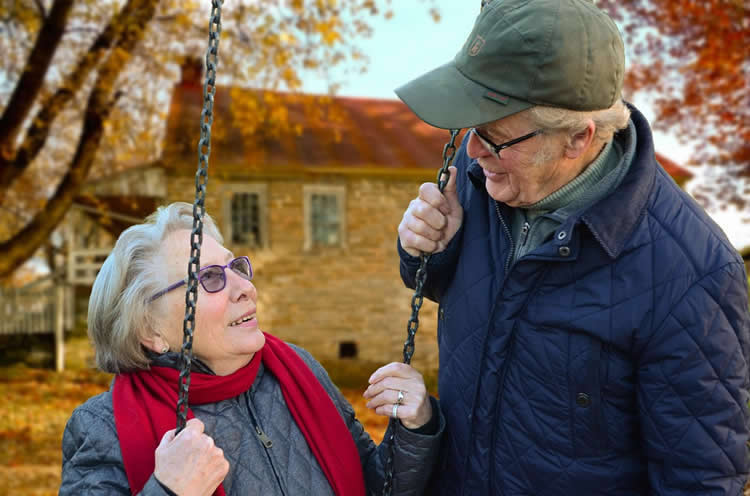Summary: Researchers say those over 60 are better at predicting stressful events at home than younger people. However, younger people are better at utilizing these predictions to minimize the adverse impact of stress.
Source: North Carolina State University.
A recent study finds that older adults are better than younger adults at anticipating stressful events at home – but older adults are not as good at using those predictions to reduce the adverse impacts of the stress.
“Home stress, in this context, might be related to chores, home maintenance and having too much to do around the house,” says Shevaun Neupert, an associate professor of psychology at North Carolina State University and lead author of a paper on the work. “Older adults – over the age of 60 – predicted and experienced more stressful events at home than younger adults. However, when younger adults – under the age of 36 – did predict these stressful events, those stressors had less of an adverse impact on their moods.
“This suggests that younger adults are doing a better job of using some anticipatory coping skills to blunt the impact of home stressors – though there was one clear exception.”
The study involved having 107 adults aged 18-36 and 116 adults aged 60-90 complete a survey on eight consecutive days related to stressors, mood, the extent to which they predicted experiencing stress the following day, and how – if at all – they were using anticipatory coping mechanisms to prepare for those stressors.
“We found that accurately predicting home stressors had very little impact on the mood of older adults,” Neupert says. “But it had a dramatically positive impact on younger adults. The one exception was for younger adults who got stuck in so-called stagnant deliberation.”
Stagnant deliberation is when people try to solve a problem but feel like they’re not making progress.

“It’s kind of like running in place mentally, and we found that younger adults who engaged in stagnant deliberation had a steep increase in negative affect when the home stressor happened,” Neupert says.
In other words, under these circumstances, the anticipatory coping actually backfires for young adults, making things worse. Meanwhile, stagnant deliberation didn’t appear to affect older adults one way or the other.
“This really highlights the distinctions between age groups when it comes to predicting and responding to stress in particular contexts,” Neupert says. “For example, this study also looked at stress in the workplace, and we found little difference across age groups. But in the home, the differences were dramatic.”
Source: David Kohn – North Carolina State University
Publisher: Organized by NeuroscienceNews.com.
Image Source: NeuroscienceNews.com image is in the public domain.
Original Research: Abstract for “Daily Stressor Forecasts and Anticipatory Coping: Age Differences in Dynamic, Domain-Specific Processes” by Shevaun D Neupert, Ph.D Jennifer A Bellingtier, Ph.D in Journals of Gerontology, Series B: Psychological and Social Sciences. Published April 19 2018.
doi:10.1093/geronb/gby043
[cbtabs][cbtab title=”MLA”]North Carolina State University ” Age Affects How We Predict and Respond to Stress at Home.” NeuroscienceNews. NeuroscienceNews, 19 April 2018.
<https://neurosciencenews.com/age-home-stress-8843/>.[/cbtab][cbtab title=”APA”]North Carolina State University (2018, April 19). Age Affects How We Predict and Respond to Stress at Home. NeuroscienceNews. Retrieved April 19, 2018 from https://neurosciencenews.com/age-home-stress-8843/[/cbtab][cbtab title=”Chicago”]North Carolina State University ” Age Affects How We Predict and Respond to Stress at Home.” https://neurosciencenews.com/age-home-stress-8843/ (accessed April 19, 2018).[/cbtab][/cbtabs]
Abstract
Daily Stressor Forecasts and Anticipatory Coping: Age Differences in Dynamic, Domain-Specific Processes
Objective
We focused on the temporal space before stressor exposure and examined two constructs– daily stressor forecasting and anticipatory coping – for daily emotional well-being.
Method
107 younger (M age = 19.44, range 18-36) and 116 older (M age = 64.71, range 60-90) participants reported on 1627 total days via an online daily diary study. Participants reported baseline demographic information (Day 1) and stressor forecasts, anticipatory coping, stressor exposure, and negative affect (Days 2-9).
Results
We found significant intraindividual variability in stressor forecasts. Increases in forecasts of upcoming stressors were associated with increases in anticipatory coping of those stressors in some domains. Older adults forecasted more upcoming home stressors than younger adults, but older adults reported less anticipatory coping than younger adults. Finally, we found age differences in emotional reactivity to daily home stressors depending on previous-day forecasts and coping of those home stressors. Forecasting home stressors was associated with a stronger reduction in reactivity for younger adults relative to older adults, but stagnant deliberation coping was associated with increased reactivity for younger adults, not for older adults.
Discussion
Daily stressor forecasts are dynamic and situation-specific and linked to daily anticipatory coping and age differences in reactivity to home stressors.






